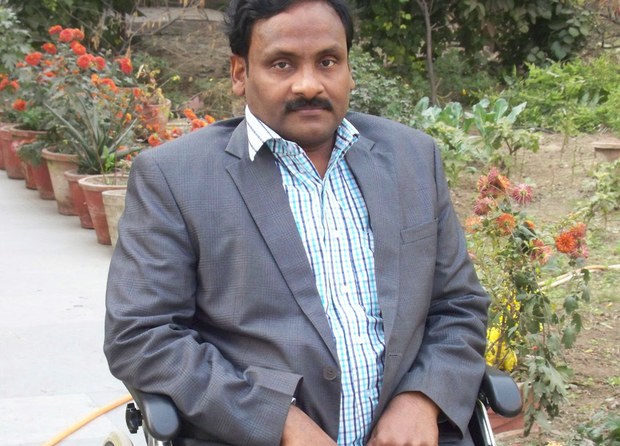India: Life Sentences for Left-Wing Activists Draw Criticism
2017.03.08
Mumbai
 Former Delhi University professor G.N. Saibaba, who suffers from 90 percent disability owing to post-polio paralysis, was sentenced to life in prison on Tuesday for his link to Maoist rebels.
Former Delhi University professor G.N. Saibaba, who suffers from 90 percent disability owing to post-polio paralysis, was sentenced to life in prison on Tuesday for his link to Maoist rebels.
An Indian court’s decision to sentence a physically handicapped university professor and four other leftwing activists to life in prison for links to Maoist rebels is drawing criticism that the Hindu nationalist government influenced the judiciary.
Lawyer Surendra Gadling told BenarNews that his clients would soon challenge the “shocking” 825-page judgment pronounced Tuesday by Maharashtra state’s Nagpur District Sessions Court.
The court issued life terms to Delhi University professor G.N. Saibaba, who is wheelchair bound and suffers from post-polio paralysis, Prashant Rahi, a former journalist, Hem Mishra, a university student, Mahesh Tirki and Pandu Narote. A sixth accused, Vijay Tirki, was sentenced to a 10 years.
They were convicted under the Unlawful Activities (Prevention) Act for being active members of a “terrorist gang or organization and offenses relating to support given to a terrorist outfit and waging war against the nation,” the court said.
Saibaba and the others are active members of the outlawed Communist Party of India-Maoist (CPI-M) and its frontal organization the revolutionary Democratic Front (RDF), judge Suryakant Shinde ruled.
“Though he [Saibaba] is physically handicapped, he is mentally fit,” Shinde said, while agreeing with the prosecution’s argument that the disabled academic deserved no leniency as he used to frequently travel abroad to spread Maoist ideology and would actively recruit youths.
Maoists, also known as Naxalites, are a leftwing extremist group fighting Indian security forces since the late 1960s from jungle hideouts in more than a third of central and eastern India’s 600 districts.
The rebels have accused successive governments of uprooting poor and landless people to exploit mineral-rich forests scattered throughout the region.
Gadling said his team was still studying the judgment, and would appeal the verdict within seven days.
‘Vague, tenuous evidence’
“It will take time to analyze the points raised by the court as this is the first time in Maharashtra that vague and tenuous electronic evidence has been used as evidence to establish guilt,” he said.
Maharashtra police had based their evidence against the six on a memory chip recovered from Mishra after his arrest from the state’s Gadchiroli district in August 2013, along with Mahesh Tirki and Narote. While Rahi and Vijay Tirki were arrested a month later, Saibaba was arrested from his Delhi residence in May 2014.
Police also claimed that incriminating data recovered from the hard disk of Saibaba’s computer showed the accused were involved in Maoist activities.
Following his arrest, Saibaba was suspended from Delhi’s Ram Lal Anad College where he taught English literature. He was held in the Nagpur Central Jail for 14 months before being granted bail on grounds of deteriorating health.
“My imprisonment has changed everything. The laughter in the family is gone, probably for good. My wife and daughter are happy I am out of jail, but there is this constant tension that I will be sent to jail again,” Saibaba told BenarNews following his release.
Government under fire
Vasantha Kumari, Saibaba’s wife, openly blamed India’s ruling Bharatiya Janata Party (BJP) for having a hand in the court’s verdict.
“This judgment is shocking. It seems the government has put a lot of pressure on the judiciary to implement anti-people and undemocratic policies at the behest of corporate firms and multinational companies.
“The government has selectively suppressed the voice of people to plunder the resources of the country,” she said in a statement.
Indian academics agreed with Kumari.
“The trend nowadays is quite obvious. Every voice critical or dissenting has to be put behind bars,” Ritu Dewan, former head of Mumbai University’s economics department, told BenarNews.
“Sentencing a well-known scholar, who is severely disabled, to life imprisonment is like a death sentence to the freedom of thought itself. Teachers are supposed to be the guardians of free speech and free flow of ideas,” Dewan said.
“Those in power feel threatened by a section of intelligentsia that has to the potential to disrupt their political base,” P.S. Vivek, a sociology professor at Mumbai University, told BenarNews.
“The events that have been unfolding since the BJP came to power points to subtle methods being adopted by the government to stifle critical thinking and instill fear in those who dare to speak against it,” he said.
Meanwhile, prosecutor Prashant Sathianathan was pleased with the verdict.
“It’s a very special verdict, especially to take care of white collared people who are involved in such [Maoist] activities. The accused in this case were high-profile people and this verdict is a message to their organizations,” he told The Hindu newspaper.







